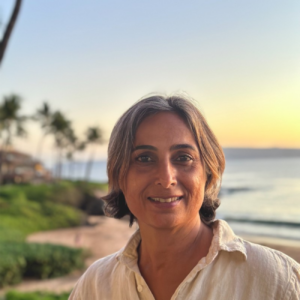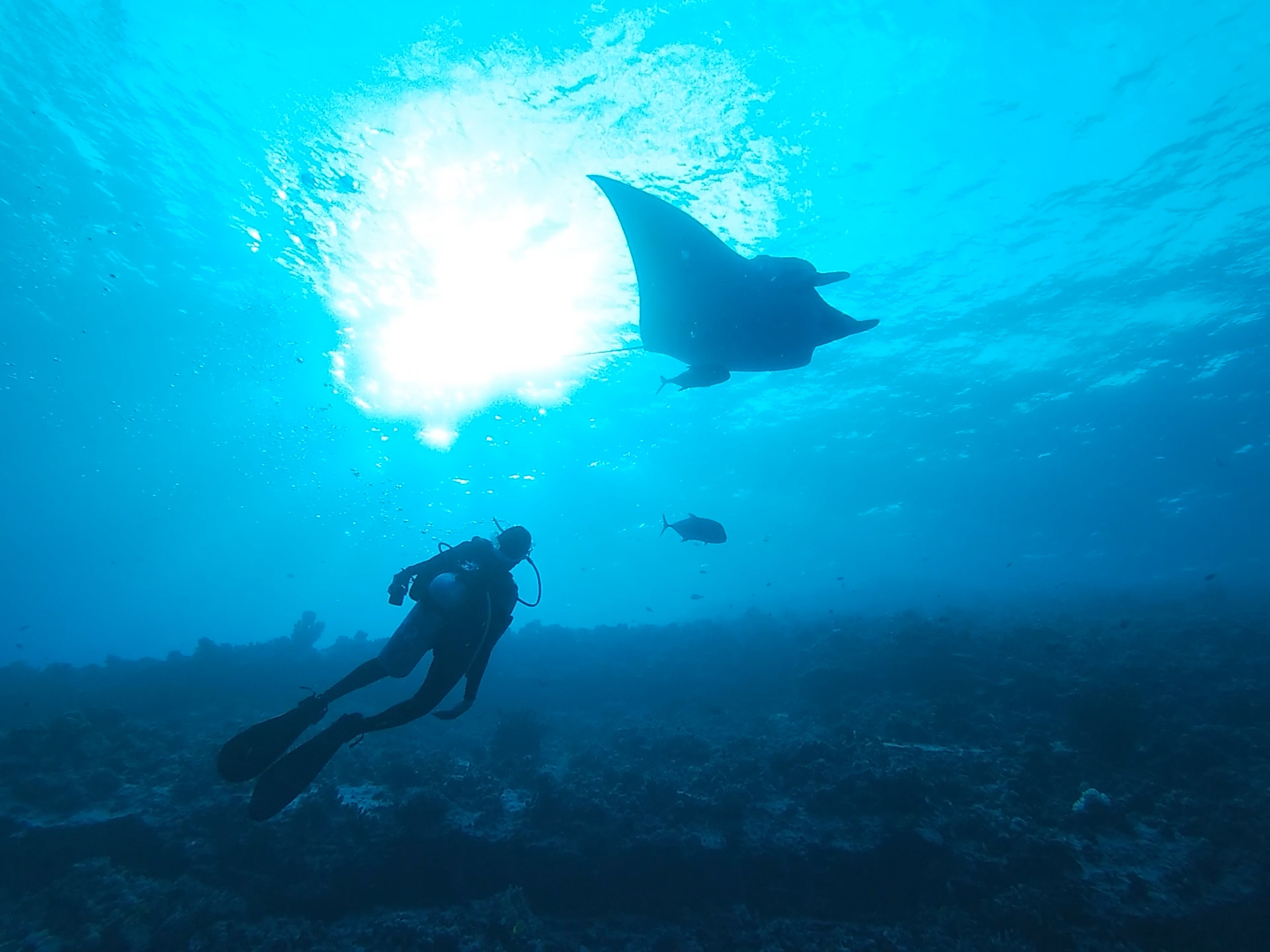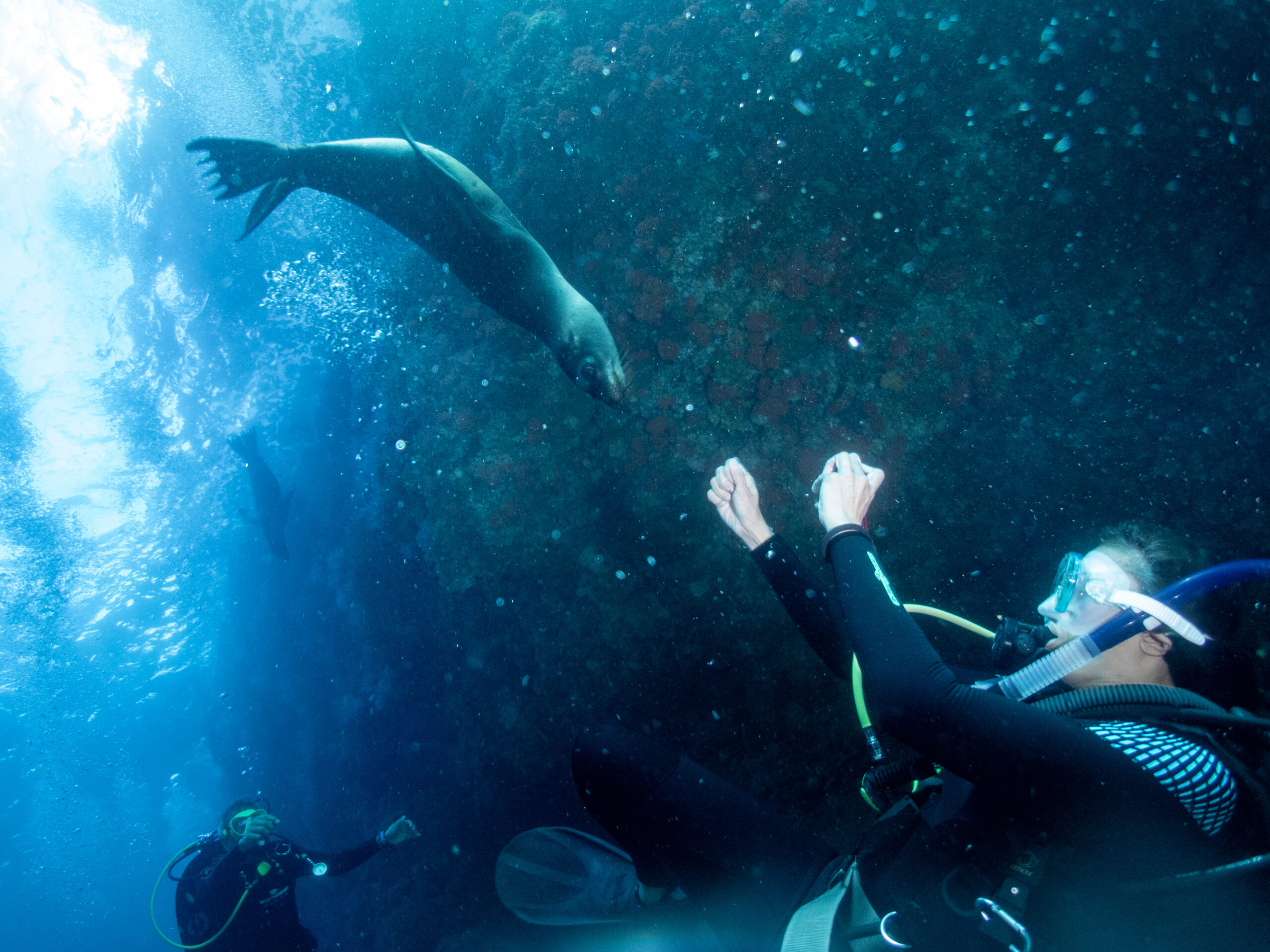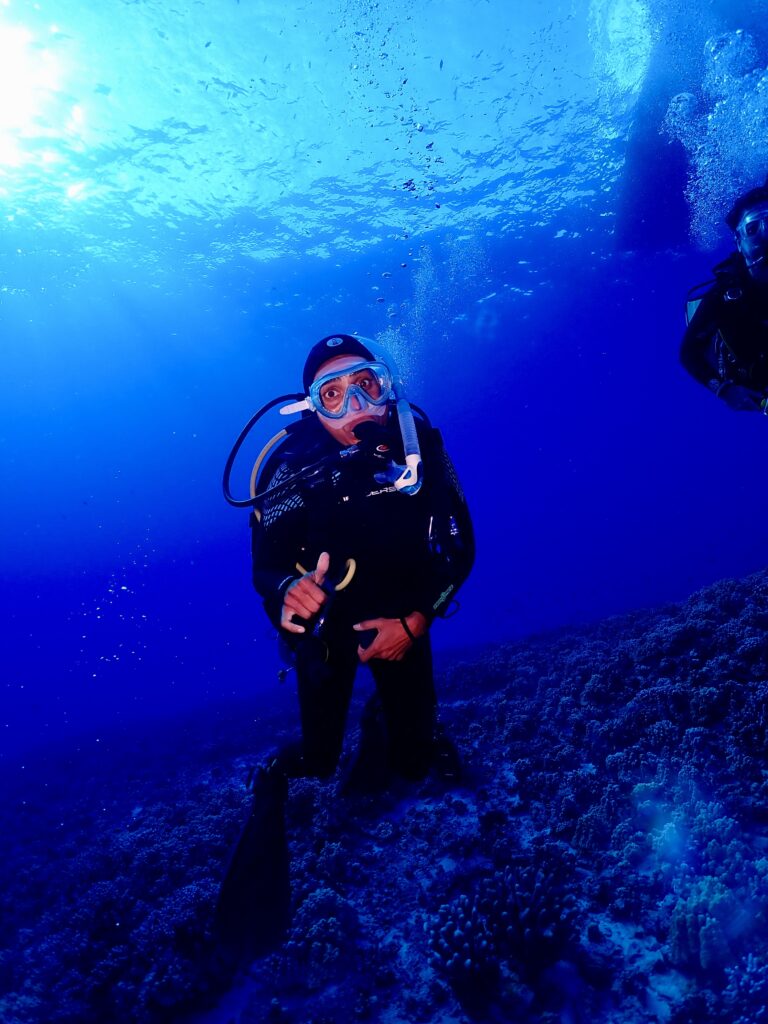Talk Story with Suparna Vashisht
 Suparna Vashisht has spent over a decade driving social change in sustainability, conservation, and gender equality working in both the corporate and non-profit sectors. She has been a diver for over 20 years and a visitor to the island since 2000.
Suparna Vashisht has spent over a decade driving social change in sustainability, conservation, and gender equality working in both the corporate and non-profit sectors. She has been a diver for over 20 years and a visitor to the island since 2000.
What is your connection to MNMRC?
I had been aware of MNMRC for many years due to my frequent visits to Maui and interest in ocean conservation, but I became directly involved right after the Lahaina wildfire in 2023. MNMRC was working with the Australia-based tech startup, Flying Fish Technologies to get 3D photogrammetry done for the coral reefs in Maui to measure the impact of the fire. Through my own work with an ocean conservation organization, I was aware of photogrammetry and was thrilled MNMRC was using the technology to help Maui’s reefs. It made so much sense that they were getting someone to come out immediately after the fires to get a baseline of reef health at that time and then repeat the process after more of the debris made its way into the ocean.
A neighbor of mine told me what MNMRC was doing with Flying Fish and that they were looking for support in housing and transporting these guys who were coming from Australia. So I helped out by providing transportation for the Flying Fish team and since then, I have been involved with MNMRC as much as I can with things like marketing, strategy, and other areas of my expertise.

Suparna encounters a Manta Ray while diving off Molokini.
Tell us about what you do for work. What outside activities do you enjoy?
Well, I would say I’m semi-retired. I’ve worked for decades in senior executive positions in top 100 Fortune companies and then non-profit organizations. Before I semi-retired I worked for over seven years for an ocean conservation organization until early 2022.
Now I volunteer my time at various organizations in Maui and elsewhere. I volunteer on a regular basis at the Maui Ocean Center Marine Institute (MOCMI), mostly helping with the rescue of sea turtles. When I started coming to Maui in 2000, I spent a lot of time in the water and I started seeing so many turtles entangled in hooks and fishing line. I wanted to do something about it, so I called MOCMI to report the turtles and I ended up calling so often that they got to know me on a first-name basis.
I am also on the advisory board for Project Coyote, an organization that works to protect wild carnivores in North America. I first learned about them in 2014 and I was so impressed because there are not many organizations that work to save wildlife in North America. We are familiar with organizations that save elephants, lions, and tigers. But in North America, we have lost such a huge percentage of our wildlife like Black Bears, Grizzly Bears, wolves, and bison. It is called Project Coyote which is a bit of a polarizing term but the Coyote are also called “song dogs.” They hold deep cultural and spiritual significance for the indigenous people of North America and are an integral part of their myths and stories. They are an important member of the American wildlife we need to protect.
About 10 years ago, I founded “Women Back to Work” with a colleague. I am not as involved as I used to be; I have limited it to offering workshops to women returners through the San Jose Public Library.
Currently, I am working on getting funding for a re-use initiative in Maui that aims to replace single-use food ware at food establishments with reusable food ware. It has turned out to be a very complex project but that has never been a deterrent for me, so watch this space!
Outside of ocean activities, like diving, snorkeling, kayaking, and paddleboarding, I love hiking. I am also a fencer and of course, I play pickleball. Who doesn’t play pickleball these days?
 You have also spent quite some time trying to live a reduced-waste life. Can you tell us more about your journey?
You have also spent quite some time trying to live a reduced-waste life. Can you tell us more about your journey?
I started my journey 20 years ago with plastic bags and single-use water bottles because I was shocked to learn that less than 9% of the plastic ever produced has been recycled and that around 50% of all plastic is produced for single use. Now, it is estimated that we’re dumping a garbage truck of plastic into the ocean every minute. I love the ocean so much that when I think about that visual, it just breaks my heart.
We are extracting resources from a finite planet, and while I am not perfect at being “zero waste” we can always look at things we can do better. I began with reusable bags, then I replaced Ziploc bags and plastic wrap with glass boxes and wax paper. A big leap happened when I started keeping reusable silverware and steel or glass boxes in my car for restaurant leftovers. Once I started doing that, even strangers would comment on how my reusable boxes were such an obvious thing to do and that they were going to start doing it, too. This made me believe in the power of individual actions to bring about group action. I believed it, even more, when my sister started making all-purpose cleaner instead of buying it in single-use plastic bottles and when my husband, who used to groan and ask me why I was doing this, suggested using t-shirts and rags instead of single-use paper towels. I was gobsmacked.
From there, we significantly reduced our waste by composting. I learned from one of my early sustainability non-profit jobs, that if you compost you can reduce your trash by up to 90%. I started with a little bin under the sink to collect food waste and used a basic compositing machine to turn it into fertilizer for our yard and fruit trees. It was a beautiful closed-loop system. We were eating the fruit, then putting the skin and cores into our compost pail, turning it into compost, and putting it into the yard where it fed the fruit trees. It became this endless virtuous loop and it was amazing. At that point, I did away with plastic liner bags because everything we were throwing away was dry. We also lowered our trash fees because we got a smaller trash bin.
Other ways our family tries to minimize waste is by being mindful about buying new things. Today, more things are produced than we can or need to physically use. I saw a statistic that said 75% of all Christmas gifts either get returned or donated. We found this to be true for us, so we instituted a “no gifts” policy. Just a generation ago, my parents used things until they broke down, then they repaired them. For them, it was an ethic and a value. It wasn’t that they couldn’t afford to buy something new. The thought was “If I can repair it why should I buy a new one?” They had much less “stuff” and they did splendidly.

Suparna photographing a sea lion while diving in La Paz, Mexico
What is your favorite Maui moment?
That is an easy one. My favorite Maui moment is snorkeling and seeing the turtles everywhere just doing their thing. Some of them are very curious and friendly, and others are just floating around. Hanging out with them in the ocean is one of my favorite pastimes. Now that I think about it, seeing the whales, especially underwater, is also amazing. It is very rare to see them while diving, but I’ve been fortunate to see them 3 different times, even though it was briefly. Of course, I keep my distance and make sure to follow the laws and regulations, but to see them underwater is just thrilling.
What is inspiring to you about MNMRC?
What I like is that they are so focused on protecting Maui’s waters. The thing I have learned is that it would be really nice if people could work collaboratively on big issues like ocean conservation. But on the other hand, because the ocean is so big, work needs to be done at a local level in all the places that need protection. Maui is no different. I think it’s great that MNMRC focuses on Maui and protecting its coral reefs and native fish especially because there is a high percentage of marine life that is endemic to Hawaii.
I also think the recent initiative with Reef-Friendly Landscaping is phenomenal. I hope more of the hotels and golf courses embrace it. I know there will be resistance to it. We all have the stories we tell ourselves like, “I only use it once a year,” but we forget the cumulative effect it has on the environment is very high.

Diving off of Molokini in March 2022.
What is your favorite Maui restaurant, local business, spot, etc.?
I like to go to restaurants that are doing their part to reduce their impact on the environment. I also like to go to restaurants that are either entirely vegan or have vegan options. Some of my favorites are:
That’s a Wrap, Abiki’s Carribbean Flavas, Maui Thai Bistro, Flatbread Pizza, Monsoon Bar & Grill, Moku Roots, and a new place called All Rice in the Piilani Shopping Center.
I have to also give a shoutout to Johnathan and Shawna of Papio’s Place, which used to be in South Maui. Unfortunately, they closed last year but they were serving fantastic food and truly doing the right thing for the environment. I hope they start something new soon!
What would you say to others who are considering becoming involved with MNMRC?
The ocean is about 70% of the world but less than 1% of philanthropy goes to protecting it. It produces 50% of the air we breathe, absorbs 31% of carbon dioxide emissions, not to mention the other benefits like storm protection from coral reefs. To me, it is shocking that we are so short-sighted about taking care of what sustains us. Where would we be without forests, rivers, and the ocean? Less than 3% of philanthropy goes to the environment—the underlying thing that sustains us all. Don’t get me wrong. It is important to focus on things like poverty, education, health, and women’s rights but none of that would exist without a healthy environment.
I have been diving in Maui for over 20 years and have seen first-hand the decline in reef health and fish population. These changes are not theoretical or something I read in a report. It makes me think about what I can do to help and increase awareness. I donate and offer my experience in marketing and strategy to MNMRC as a way to make a direct impact on the ocean. Do whatever you can to help and do it today—the health of our ocean cannot wait!



No Comments
Sorry, the comment form is closed at this time.